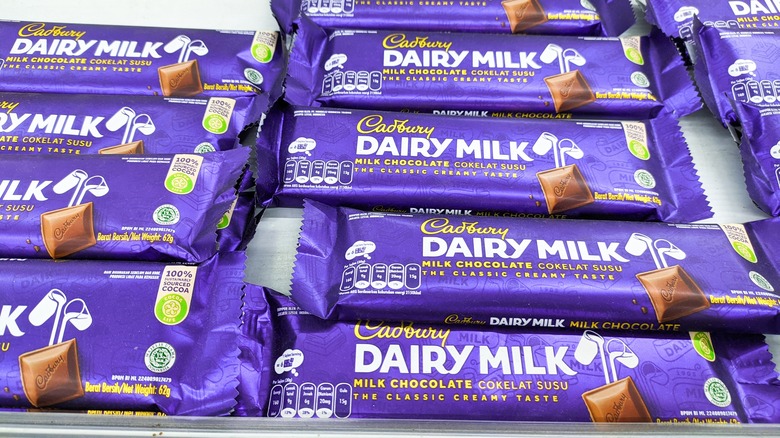Cadbury Just Lost The Royal Warrant It's Had Since Queen Victoria
You may know Cadbury for its distinctive purple foil-wrapped bars of chocolate, like Fruit and Nut or Caramello, or maybe the brand makes your favorite chocolate bunnies and Easter eggs, including its famous creme eggs filled with decadent fondant. Needless to say, the chocolate company is well-regarded — however, Cadbury just unexpectedly lost one of its famed markers of quality: a royal warrant from the British monarchy.
Regardless of which Cadbury candies you enjoy, goods made by the company have been granted a royal warrant each year since the rule of Queen Victoria. Impressively, this means Cadbury has carried a regal stamp of approval since 1854. In England, a brand with one of these warrants is recognized as providing goods or services to the royal family on a regular basis. Surprisingly, as of December 2024, Cadbury was not mentioned on the royal warrant list, losing its 170-year-old stamp of approval under the order of King Charles. The royal coat of arms, a seal that signifies the warrant, will no longer be printed on Cadbury's packaging moving forward.
Why did Cadbury lose its royal warrant?
The exact reason for Cadbury losing its royal warrant is unclear. Some speculate that its removal its due to Britain not wanting to endorse brands that still do business with Russia. Mondelez International, Cadbury's parent company, continues production in Russia despite its conflict with Ukraine. However, the warrant loss could also be due to the evolution of the company.
Cadbury Chocolate began in Birmingham, England. It was a family-owned business dating back to the 1820s that focused on providing its workers with quality conditions and welfare. Later on, World War I led to the popularization of candy bars, as British soldiers were given chocolate treats to provide a much-needed spark of energy and morale. As Cadbury grew in popularity post-war and beyond, it continually snowballed into a large corporation all its own, until it was sold in 2010 to the United States company Kraft, later joining its snack department Mondelez.
This transition from a British-owned company to a U.S.-owned one received criticism in England. Mondelez itself has also faced other controversies, such as deforestation and even accusations of using child labor, which could have warded the royal family off. Whatever the true reason is for removing Cadbury's royal warrant, the world may never know. Those who love to snack on Cadbury bars — or chop them up for a skillet chocolate chip cookie and two-ingredient chocolate ganache – will undoubtedly still be able to, but the loss of the royal seal of approval could hurt the company's reputation.


